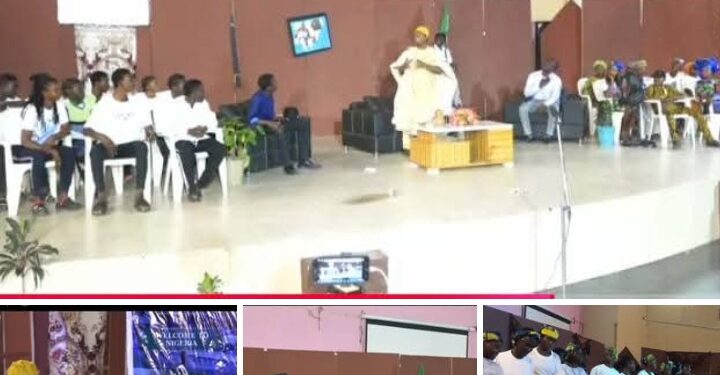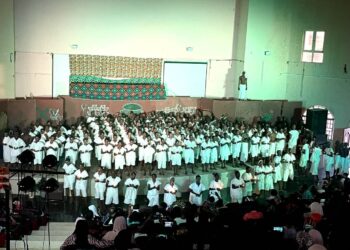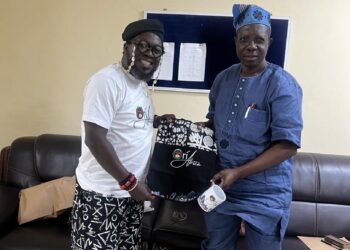‘Tunji Solomon
Art Review

Ola Rotimi’s Our Husband Has Gone Mad Again EXPLORES our VULNERABILITY, SHAMES our FOLLY!
THE DRAMA comes at a time when a lot needs to be fixed in Nigeria, when things are getting worse and we pretend every thing is in order. We look forlorn within our inner mind, we raise hope to minimum level, the maximum level looks unattainable. We cannot be doing the same thing the same way and be expecting different results. Not at all!
POSTHUMOUSLY, A great thank you to Prof. Ola Rotimi for his evergreen play that would always reminds us of how far we have failed to chat new course for our own development. It had been a journey in cycle. It is like a yearly pilgrimage journey to nothing. Nothing has actually changed for the better.
WELCOME ONCE again to the world of satire loose upon us through the abyss of creativity of one of Nigeria’s best playwrights. In his exit, he left impacts behind: he lives on among us, and his frankness and reality speak louder than our feelings. Ola Rotimi, in his innocuous approach to his plays, did not give us something new about ourself, but reminds us about our vulnerability as Our Husband Has Gone Mad Again, brings to the fore once more: why we are where we are.
TO BEGIN with the opening scene brings to our attention once again: the stuff our political space is made of: with the National Liberation Party (NLP) candidate in person of ex-military officer, Major Rahman Taslim Lejoka-Brown (Lekan Ajayi), enthusiastic about his political ambition after he metamorphosed into civilian and democratic dispensation, little is left unturned to realise his lofty goal. The Reformed Party’s (RP) desire for freedom is what Major Rahman will not have none of. Thus, with his fiery and furry nature, the campaign team of the two parties were dispersed. Light out.
WITH THE conflict unfolded, it promised to be a long afternoon that likely to be stretched into evening. It did. The subsequent scenes, like Oliver Twist, bring more intrigues and schemes. Major Rahman in company of Gideon Abednego Okonkwo (Iteola Olawale), reminisce and dissect the nature of Nigerian politics. A food for thought, space for strategiew. Like the Nigerian soap opera: The House of Commotion; Major Rahman’s household is a metaphor for complex and disturbing issues. As Professor Taiwo Oloruntoba-Ojo noted: “…he enters the fray with a mish-mash of old military ideas and a bag of domestic troubles”. The realities await him.
WITHIN HIS household, he married three different women for different reasons and purposes. To begin with, he married Sikira (Promise Adeagbo) because she is a daughter of Madam Bambina (Tolu Falade) – who is the president of youths in the nation: a political strategy to get votes. Sikira, rude in nature, impolite to elders: Alhaji Mustapha (Patrick Aduragbemi). She is a typical shy-lock modern lady, no-nonsense and rebellious with hidden ambition.
ON THE other hand, he married Mama Rashida only four months ago. “I married the problem only four months ago”, Rahman tells Gideon, who is surprised to learn about his polygamy status. In the midst of Major Rahman’s explanation to Gideon, the unexpected news on the arrival of Lisa (Odunayo Olajuwon) by Polycarp (Olayinka Adeleye) comes as a surprise to Rahman – who is only preparing his political strategy of surprise and attack against the opposition party.
LISA – A Kenyan lady, medical professional who once rescued Rahman, he fell in love with her, and they married in Congo; but resides in United States of America; is the only woman Rahman truly loves wholeheartedly. But never disclosed that he is a polygamist by construction and default. He cannot but find a way to navigate between three women with his sole strategist’s adviser, Gideon Abednego Okonkwo.
SURPRISINGLY, LISA arrives ahead of the scheduled 5pm local time, while Rahman and Gideon await her arrival at the airport. Lisa met an unexpected hostile hospitality and disposition from the body languages of Mama Rashida and Sikira. Facing the reality of being officially married to an unrepentant polygamist called Major Rahman six years ago, she cannot but called him “uncouth, monster…” “I don’t care if you marry taxi driver”, says Sikira.
MOVING FORWARD, at the airport, Major Rahman and Gideon cannot but rehearse strategy to win the heart of Lisa on her arrival, though ignorant of the reality of her arrival at home. Polycarp, a subtle, intelligent and innocent character, was sent to convey the unexpected news to Rahman by Mama Rashida, he breaks the news to the dismay of Rahman. His plans shattered? Not entirely.
MAJOR RAHMAN’S return to his residence in company of Gideon is like walking on difficult terrain. Lisa, boiling with rage and furry after being ‘deceived’ into a union she believes she is the only character to call the shots. His explanation on how things panned out didn’t work with Lisa, but baited by the prospect of being the first lady of the politically ambitious Major Rahman.
CONSEQUENTLY, LIKE packs of cards, things fall apart between Rahman and his wives: Sikira left for her mother’s house with the parting statement: “our husband has gone mad again”. While Mama Rashida stylishly returns to the village, and Lisa? She stays based on her terms and conditions.
LIKE A feedback, the NLP called for emergency meeting to resolve the crisis caused by Rahman in the presence of the press men – who were caught in the rage of Rahman’s assault and molestation of the gentlemen of the press. At the emergency meeting, vote of no confidence was passed on Major Rahman and the need for new candidate was embraced. Like the Nigerian political situation, factions emerge. Similarly, Madam Bambino’s Campaign team aims to nominate new candidate, with ambitious Sikira in the scheme. The women want to take the desire lead roles in the scheme of things.
LIKE A tragedy, Major Rahman’s political ambition ends before it starts due to the NLP emergency meeting he didn’t attend. He was removed as nominated candidate for prime minister. He is done with politic, and inevitably needs to return to his cocoa business as last resort. Rahmon dejected and humbled by the turn of events, resigned to fate. As Gideon Abednego Okonkwo laments in consolation with his friend: “Water don pass garri!”
AT THE outside of his residence, the protesters led by Sikira’s thunderous voice and their chants, filter into his ear:
“Freedom, freedom;
Freedom for you,
Freedom for me;
Freedom for Africa,
Freedom for Nigeria…”
IRONICALLY, THERE is no freedom for Nigerians. Freedom remains elusive. “No more, no less”.
KUDOS TO the entire members of the cast. Special recognition cannot but be showered on the orchestra and singers – who bridge the transition from one scene to the other, and made the noon enjoyable and memorable. The stage-hands deserve applause too.
…………
DOWN THE memory lane, Doll’s House, the Henrik Ibsen’s classic play, comes into reckoning through the window and the theme of Ola Rotimi’s Our Husband Has Gone Mad Again; in which Nora, like Sikira, a significant character, walks out on her father and her husband – as metaphoric agitation for feminism contexts. This is an important interpretation of female activism and the paradigm-shift in gender issues and its every day dynamics. As a playwright gimmick, within the scope of gender dynamics lies the intricacies of female agitation for better space and relevance in the society, mirrored by small space called family, primarily led by men.
SIGNIFICANTLY, OLA Rotimi not only presents the play as portrayal of continued female subjugation in many forms and diverse ways, but explores the corridor of traditional feminist roles, responsibilities and utilisation of open space of patriarchal African society – which Nigeria is a key player.
STILL ON the context of “Again” in the title, it reflects a sort of cycle that plays itself out day-in-day-out and year after year. The state of ‘madness’ depicts as a symbolic representation of undesirable elements in the character of an husband – a leader – not only talks to the character, it talks to us as individual who fails to lead as expected in the capacity of a leader – regardless of where you find your self, lead us well.
AS THE Isoko, Delta State born Nigerian musician: John Odafe Asiemo famously called Daddy Showkey, waxed in his evergreen album, titled: Mr. President Leads Us Well; with pidgin English that resonates and cuts across the lower cadre of the society to the echelon:
“Mr. President leads us well,
Make una leads us well,
No let this nation to fall inside well;
If you be governor, leads us well,
Govern us well;
If you be Senator,
Senate am well;
If you be police,
Police well well, no dey take bribe!
O ya lead us well,
(Nne me e)
Govern us well,
Police us well,
Don’t take bribe…”
MOREOVER, OLA Rotimi uses humorous and literary venoms to sting, expose the weaknesses, and follies of those within the lobby of power. The play’s exploration of gender dynamics and political issues makes it a valuable piece of literature for understanding the socio-political space of post-independence Nigeria in particular, and by extension, other African nations.
THE THEME also echoes Wole Soyinka’s satiric play: King Baabu – which stretches to the extreme end of reference to the duo of military involvement and the established traditional leaders and rulers; who have failed to change the misfortune of a nation in search of an hero.
SIMILARLY, THE context of failed leadership is silently extended, regardless of being new entrant or old horses in leadership space, women or men, have not lived up to expectations of the masses and the yearning of the spectators. Frankly, Our Husband Has Gone Mad Again, did not come alive alone: it equally mirrors Femi Osofisan’s Kolera Kolej’s thematic occupation of leadership failure in many forms and shapes that cut across the academia, and the secular society.
THE CHOICE of words, roles, characterization, thematic interpretations, and satirical impacts; added values to the play’s laughable and humourous effect, showcasing the weaknesses of the leaders and the society they lead.
Like Samuel Beckett’s memorable book: Waiting for Godot?, the society cannot but look forward to an expectation that may never come. The masses can only keep the hope alive, while the nation remains in a state of constant repair, not moving forward. Brutally clear: truth fails when society honours lies.
……….
PARTS OF of the Maiden Convocation Play and Cultural Variety Marking 35th Anniversary of LAUTECH, was the recreation of Ogbori Elemosho classic movie as a form of recognition and contribution of Chief Lere Paimo to theatre art in Nigeria. The feeling was nostalgic. The memory refreshed.
THE SECOND segment entailed the Award of Excellence in Creative Art given to the duo of Chief Lere Paimo of Eda Onile-Ola niche – in which Professor Niyi Osunbade of English and Literary Studies Department read his rich resume, and Mr. Francis Onwochei – one of the Nigerian finest Nollywood icons, whose citation was read by Miss Regina Olubunmi of Theatre Art Department, LAUTECH.
DIGNITARIES AT the Convocation Play were: the Vice Chancellor, Prof. R.O. Rom Kalilu, Chairman, Ceremonials Committee, Prof. Jide Ajao, the Dean, Faculty of Arts and Social Sciences, Prof. Temisan Ebijuwa, among others.
Hope to see you again!
You can get every of our news as soon as they drop on WhatsApp ...To get all news updates, Join our WhatsApp Group (Click Here)











